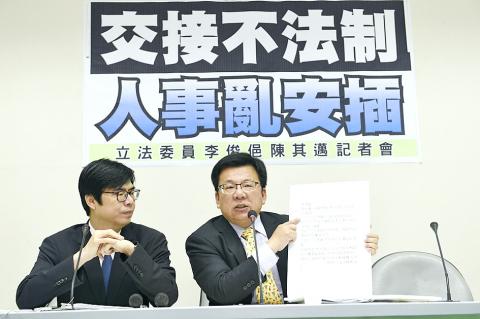Democratic Progressive Party (DPP) legislators yesterday rebutted allegations from Chinese Nationalist Party (KMT) caucus whip Lai Shyh-bao (賴士葆) that DPP legislation on the transition of presidential power is unconstitutional, adding that recent frequent shifts in government positions show that such a law is necessary.
Lai said that legislation to regulate what an outgoing president may do, which items should be transferred to the incoming president and the legal status of the incoming president might be unconstitutional, since it would put restrictions on the presidential power granted by the Constitution.
DPP legislators Lee Chun-yi (李俊俋) and Chen Chi-mai (陳其邁) yesterday disagreed.

Photo: George Tsorng, Taipei Times
“The reason why we need such legislation is that, after democratization, rotation of power has become usual, yet how the transition of power should proceed and what the outgoing president may or may not do are not regulated by any law,” Lee said. “In 2008, the KMT also proposed similar legislation, which would freeze the outgoing president’s power to sign treaties and agreements, as well as appointing officials.”
“If the KMT believes it is unconstitutional, why did it previously propose a bill that is almost identical to ours?” Lee said.
Chen said the Civil Functionaries Appointment Act (公務人員任用法) also restricts the power of elected officials to make appointments.
“According to the law, an outgoing elected official may not appoint new officials between the election day and the inauguration of the successor,” Chen said. “As the law does not apply to the president, what we are doing is filling in the loophole. If restricting presidential power is unconstitutional, why is the Civil Functionaries Appointment Act constitutional?”
Lee said that according to official statistics he obtained from the Executive Yuan’s Directorate-General of Personnel Administration, there had been frequent personnel appointments and transfers between July last year and Jan. 29.
“There have been cases where specially appointed officials were turned into public servants, which means these people would be protected by legal tenure, and the new government would not be able to do anything to them,” Lee said. “This is why we need an act to prevent such irregularities.”

SHIPS, TRAINS AND AUTOMOBILES: The ministry has announced changes to varied transportation industries taking effect soon, with a number of effects for passengers Beginning next month, the post office is canceling signature upon delivery and written inquiry services for international registered small packets in accordance with the new policy of the Universal Postal Union, the Ministry of Transportation and Communications said yesterday. The new policy does not apply to packets that are to be delivered to China, the ministry said. Senders of international registered small packets would receive a NT$10 rebate on postage if the packets are sent from Jan. 1 to March 31, it added. The ministry said that three other policies are also scheduled to take effect next month. International cruise ship operators

HORROR STORIES: One victim recounted not realizing they had been stabbed and seeing people bleeding, while another recalled breaking down in tears after fleeing A man on Friday died after he tried to fight the knife-wielding suspect who went on a stabbing spree near two of Taipei’s busiest metro stations, Taipei Mayor Chiang Wan-an (蔣萬安) said. The 57-year-old man, identified by his family name, Yu (余), encountered the suspect at Exit M7 of Taipei Main Station and immediately tried to stop him, but was fatally wounded and later died, Chiang said, calling the incident “heartbreaking.” Yu’s family would receive at least NT$5 million (US$158,584) in compensation through the Taipei Rapid Transit Corp’s (TRTC) insurance coverage, he said after convening an emergency security response meeting yesterday morning. National

PLANNED: The suspect visited the crime scene before the killings, seeking information on how to access the roof, and had extensively researched a 2014 stabbing incident The suspect in a stabbing attack that killed three people and injured 11 in Taipei on Friday had planned the assault and set fires at other locations earlier in the day, law enforcement officials said yesterday. National Police Agency (NPA) Director-General Chang Jung-hsin (張榮興) said the suspect, a 27-year-old man named Chang Wen (張文), began the attacks at 3:40pm, first setting off smoke bombs on a road, damaging cars and motorbikes. Earlier, Chang Wen set fire to a rental room where he was staying on Gongyuan Road in Zhongzheng District (中正), Chang Jung-hsin said. The suspect later threw smoke grenades near two exits

The Forestry and Nature Conservation Agency yesterday launched a gift box to market honey “certified by a Formosan black bear” in appreciation of a beekeeper’s amicable interaction with a honey-thieving bear. Beekeeper Chih Ming-chen (池明鎮) in January inspected his bee farm in Hualien County’s Jhuosi Township (卓溪) and found that more than 20 beehives had been destroyed and many hives were eaten, with bear droppings and paw prints near the destroyed hives, the agency said. Chih returned to the farm to move the remaining beehives away that evening when he encountered a Formosan black bear only 20m away, the agency said. The bear